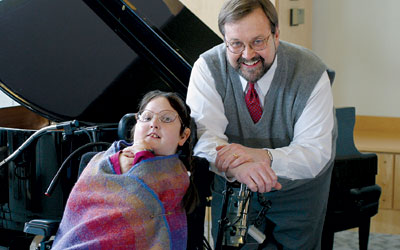The Sacred Sound of Music: In Gratitude
for Divine Blessings
By Rick Steele

December 3, 2004
The following story is meant as an expression
of gratitude to Seattle Pacific University’s splendid Music Department for the
wonderful Sacred Sounds of Christmas concert they put on at Benaroya Hall last
night. But along the way it will probably descend into maudlin, autobiographical
sentimentality. I apologize for that ahead of time. If you don’t like sentimentality,
you may as well stop reading right now. Caveat lector. But please don’t let the
gushiness of the form obscure the seriousness of the point, which is to commend
our colleagues in the performing arts for the brilliant work they do.
Nineteen
years ago, my wife Marilyn and I bought a new piano — an Everett upright. We
shopped for it during the holiday season and were planning to buy it as a Christmas
present for each other. At that time, Marilyn was pregnant with our first child,
who was due in early January. The plan was to have the piano in the house before
the baby arrived — and then greet our newborn with music. We imagined the day
a few years in the future when our daughter would begin taking piano lessons
herself.
But, as Robert Burns observes, “the best laid plans o’ mice and men
gang aft agley.” For one thing, Sarah arrived 10 days early — before the piano
was delivered. So while Marilyn was still in the hospital with her, I arranged
to have the instrument delivered and tuned. It was a minor glitch in a good plan,
and the solution represented a major victory for hubby, whose household management
skills are, well, modest at best. Moreover, we had a “Christmas baby,” instead
of a “New Year’s baby,” which meant a nice year-end tax deduction. And on Christmas
morning, Sarah was brought from the nursery to her mother swaddled in a red-and-
green felt stocking. Nothing quite like the maternity ward of a Catholic hospital
at Christmastime.
Four months later, the bottom fell out of our lives. Sarah
was diagnosed with a rare genetic disease that causes the skeletal muscles to
turn into bones. Over time, the body is completely encased by heterotopic bone
and thus immobilized. In effect, it turns into a kind of living statue. Marilyn
and I both remember leaving the hospital after we learned of this ghastly disease.
For some bizarre reason, I thought of that new piano, and burst into sobs, realizing
that if her arms locked, she would never play it. The purchase suddenly seemed
futile and pointless, and the thought that our home would not be graced by the
sound of our daughter practicing scales and arpeggios symbolized the death of
the elaborate fantasy-future that we had created for our firstborn. And my fears
were warranted. Sarah’s arms locked when she was about 3, and she has never been
able to reach the keyboard.
But divine grace is what we find when our all-too-human
plans and fantasies disintegrate. Over the years, Sarah has, in spite of her
disabilities, proved to be a rather good musician. She cannot play any instrument,
but she can sing. Her voice is soft and thin, because the ossification of her
ribcage has severely reduced her lung capacity, and the ossification of her jaw
muscles prevents her from opening her mouth more than a centimeter or so. But
her pitch and tone are fine, and when she entered SPU as a freshman this fall,
she signed up for Women’s Choir. She has loved every minute of it.
Last night,
as I watched Sarah on the stage of Benaroya Hall, singing Gounod and Mendelssohn
with 200 fellow SPU students, I once again burst into tears. But these were not
tears of sorrow and fear. These were tears of astonishment and gratitude for
the many people — faculty, staff and students alike — who have made it possible
over the past three months for her to participate in our University’s brilliant
music program, a program that includes a richly variegated repertoire and is
crowned each year by a Yuletide performance in one of the premier concert halls
in the world.
The privilege of participating in such a program is not lost on
Sarah. She worked hard to get ready for last night’s concert. She spends her
weekends at home, and during the last couple of weekends she has practiced her
music assiduously. She was accompanied by Marilyn, playing our 19-year-old Everett
upright piano. Like ourselves, the instrument is showing signs of age. But to
me, it has never sounded better.

A professor of moral and historical theology
at Seattle Pacific University, Rick Steele chairs the Department of Theology,
is chair-elect of the University Faculty and was selected as the 2004 Weter Lecturer.
SPU freshman Sarah Steele likes to do handcrafts and plans to major in Spanish.
Back to the top
Back to Home
|
 |



From the President
With years of experience in business and higher education, President Philip Eaton brings a unique perspective to the subject of good business. “For me,” he says, “business is all about investing in a worthy vision.”
Circle of Influence Grows
Nearly 4,000 new donors have supported The Campaign for SPU, including those
with no previous connection to Seattle Pacific. [campaign]
Planning for Casey’s Future
SPU faces challenges in its efforts to retain and maintain Camp Casey while working to preserve its historic and environmental resources. [campus]
Talk About Imagination
Professors of physics and art probe the “brilliant bridge” between their two
disciplines. [faculty]
You Can Go Home Again!
Hundreds of SPU alumni and families returned to campus for Homecoming. See photos of “Discover More in ‘04.” [alumni]
Legends of the Falcons
The Falcon Legends Athletic Hall of Fame inducted the Class of 2004, including a celebrated coach and four honored athletes. [athletics]
|
 |



